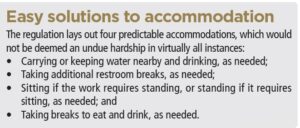WITH 2025 NOW upon us, so is a slew of new laws and regulations that will affect California businesses.
Last year was a busy legislative session in addition to a rash of important rulemaking.
The end result is another round of new legislation that California employers need to stay on top of.
1. ‘Captive audience’ meetings barred
Starting Jan. 1, California employers are prohibited from requiring employees to attend “captive audience” meetings where the employer shares its opinions on political or religious matters.
This includes topics such as unionization, legislation, elections or religious affiliations.
Employers are also barred from retaliating, discriminating or taking any adverse action against employees who opt out.
The law applies broadly to most employers, but does include some exceptions, including religious organizations, political organizations and educational institutions providing relevant coursework.
Employers who violate SB 399 could face significant consequences, including a civil penalty of $500 per employee, per violation.
2. ‘Egregious’ offenders
Cal/OSHA is working on new rules, expected to take effect in 2025, that would step up enforcement and penalties against California employers that commit “egregious” and “enterprise-wide” workplace safety violations.
A business cited for an egregious violation could be fined up to $158,000 “per instance,” meaning it can be applied for each employee exposed to the violation.
Violations that could be considered egregious include:
• The employer intentionally making no reasonable effort to eliminate a risk.
• The employer has a history of one or more serious, repeat, or willful violations.
• The employer intentionally disregarded its health and safety responsibilities.
3. Expanded paid sick leave
Two bills expanded the use of paid sick leave, starting Jan. 1.
The more far-reaching measure, AB 2499, expands current state law that allows employees who are victims of appearances, treatment, and various other reasons.
The new measure also expands the use of paid sick leave to cover certain “safe time” absences for issues like:
• Domestic violence,
• Sexual assault,
• Stalking, or
• Violence, brandishing a weapon, or making threats of physical injury
or death.
AB 2499 also permits workers to take time off to help family members who are victims of a crime.
The second measure, SB 1105, allows agricultural workers to use accrued paid sick leave to avoid wildfire smoke, excessive heat or flooding conditions.
The measure states that this is a clarification that existing law allows workers to take sick days for preventive care.
4. Freelance Worker Protection Act
Starting this year, California’s Freelance Worker Protection Act imposes new requirements on businesses hiring freelance workers for professional services worth $250 or more.
The law requires employers to provide freelancers with a written contract outlining key details, including the services provided, payment amounts and deadlines for compensation.
If no payment date is specified in the contract, freelancers must be paid no later than 30 days after completing their work.
Businesses cannot require freelancers to accept less pay than agreed upon or provide additional services after work has begun as a condition for timely payment.
Importantly, the law also prohibits retaliation against freelancers who assert their rights, such as raising complaints about violations or seeking enforcement of the law. Noncompliance can lead to significant penalties. If a written contract is not provided, employers may face a $1,000 penalty. Late payments can result in damages up to twice the amount owed, while other violations may require businesses to pay damages equal to the value of the contract or the work performed.
5. Indoor heat illness
These new requirements actually took effect at the end of last summer, so 2025 is the first full year they’ve been in effect.
Cal/OSHA’s indoor heat illness prevention rules require employers to protect workers in indoor workplaces when temperatures reach 82 degrees Fahrenheit or higher. These regulations apply to most indoor settings but mainly affect restaurants, warehouses, and manufacturing facilities. At 82 degrees, employers must ensure workers have cool, potable water nearby and access to a cool-down area where temperatures remain below 82 degrees. Workers should be encouraged to take rest breaks to prevent heat-related illness and be monitored for symptoms during these breaks. If clothing restricts heat removal or radiant heat sources are present, these measures apply immediately.
At 87 degrees, employers must take additional steps, when feasible, such as cooling work areas, providing personal heat protective equipment, and implementing work-rest schedules. Affected employers should evaluate options like installing air conditioning to maintain safe temperatures. While this is feasible for smaller spaces, larger facilities like warehouses may require
alternative compliance strategies.
6. PAGA reform
In July 2024, Gov. Newsom signed into law two measures aimed at curbing rampant abuse of the Private Attorneys General Act, which has become a costly thorn in the side of businesses in California.
PAGA allows workers who allege they have suffered labor violations, like unpaid overtime or being denied mandatory meal and rest breaks, to file suit against their employers rather than file a claim with the state Department of Labor Standards Enforcement.
The new laws aim to reward employers with reduced penalties if they address in good faith issues raised by an employee.
For example, the reforms cap the assessment at 15% of the available penalty for employers that take immediate and proactive steps to bring themselves into compliance with state law. Employers that take “reasonable” steps to address issues within 60 days of receiving a PAGA notice will face a maximum penalty of 30%.
The new PAGA also requires a worker to personally experience violations alleged in a claim if they want to bring action. It also increases workers’ share of awards to 35%, from 25%. The rest of the funds go to the Labor & Workforce Development Agency.
7. Family leave change
A new law, AB 2123, bars employers from requiring that workers who plan to take time off under the state’s Paid Family Leave Program first take up to two weeks of accrued vacation time before benefits kick in.
8. Driver’s license queries
Starting Jan. 1, employers are barred from listing in help wanted ads and job applications that having a driver’s license is a prerequisite for a job, unless the employer:
• Reasonably expects that driving will be part of the job, and
• Reasonably believes that allowing the employee to use alternative forms of transportation (including ridesharing, taxi, or bicycle) would take more time or require the business to incur higher costs.
9. Poster updates
Employers have to update two mandatory work posters this year.
The standard poster that informs employees about their rights under workers’ compensation laws, needs to be updated.
The new poster must include language stating that employees may consult with an attorney for advice about workers’ comp law and that they may have to pay attorneys’ fees if they hire a lawyer as part of their claim.
Also, businesses are required to post an updated paid leave law notice to reflect the changes ushered in by AB 2499, the paid leave law for crime and abuse victims discussed above.
10. Minimum wage
California’s minimum wage increased to $16.50 an hour on Jan. 1. This rate is for all areas of the state, except for those jurisdictions that have implemented their own minimum wage to reflect the higher cost of living in their area.





